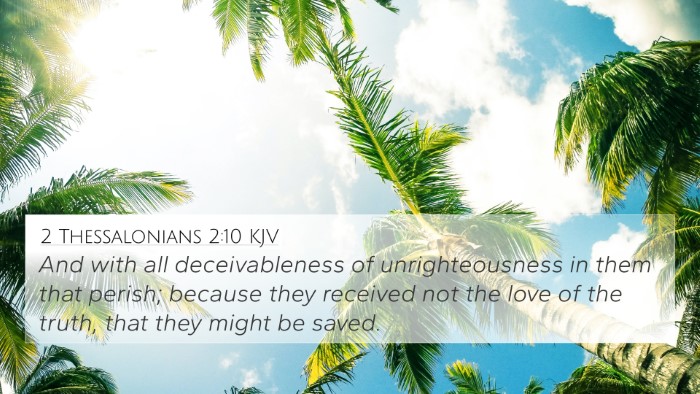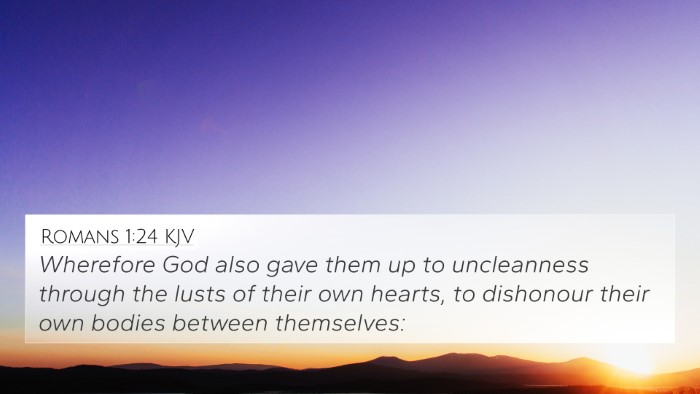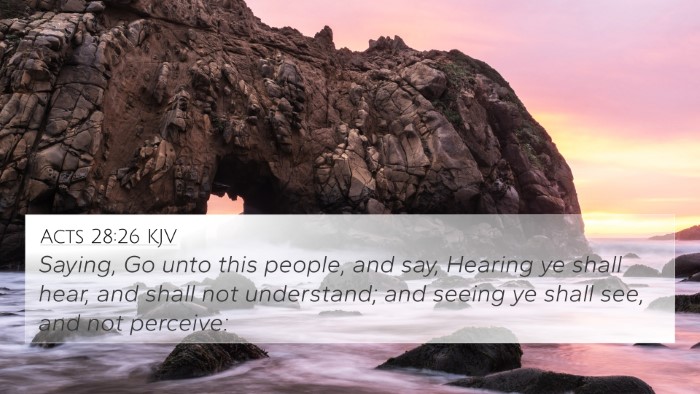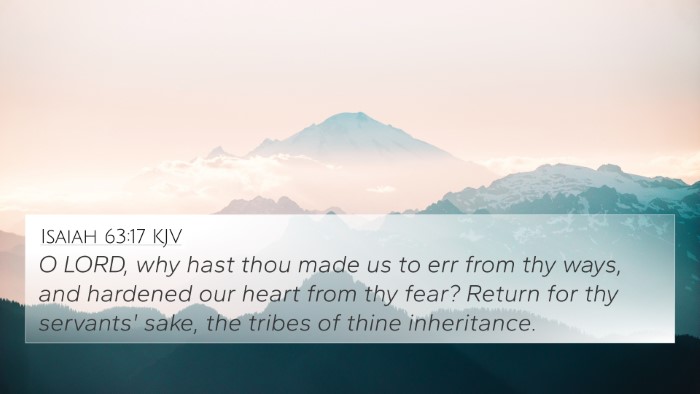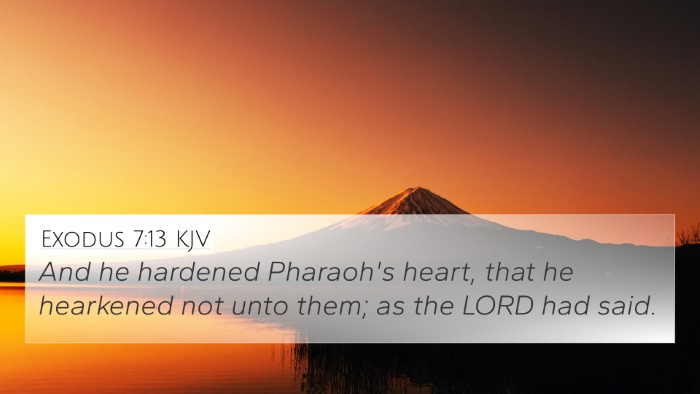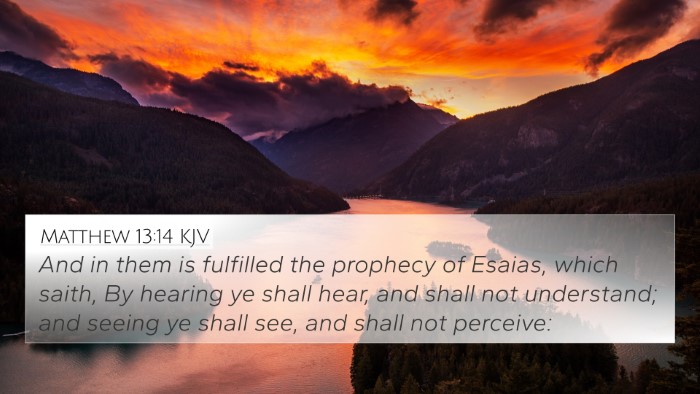Understanding Romans 9:18
Romans 9:18 states: "Therefore hath he mercy on whom he will have mercy, and whom he will he hardeneth." This verse highlights significant theological concepts regarding God's sovereignty and mercy. Below, we present a synthesis of insights derived from respected public domain commentaries, including those by Matthew Henry, Albert Barnes, and Adam Clarke.
Meanings and Insights
Romans 9:18 delves into the profound theme of divine sovereignty. It illustrates how God, in His omnipotent nature, exercises mercy according to His will:
- God's Sovereign Choice: Matthew Henry emphasizes that God's decisions are not arbitrary; rather, they reflect His divine wisdom and purpose. His bestowal of mercy is based on His eternal will rather than human merit.
- The Hardening of Hearts: Albert Barnes notes that God's hardening of hearts is not a mere act of judgment; it serves a greater purpose within His redemptive plan. This hardening can lead to deepening one's sin and, in some cases, serves to manifest God's glory through deliverance.
- Human Responsibility and Divine Will: Adam Clarke asserts that while God's sovereignty is paramount in showing mercy and hardening hearts, humans are still accountable for their responses. This interplay invites inquiry into how God's will and human actions coexist.
- Mercy and Judgment: The verse celebrates God's mercy while acknowledging that justice accompanies His sovereignty. Those who experience mercy receive unmerited favor, while judgment may come through hardening.
Cross-References for Better Insight
Below are several Bible verses that echo similar themes as Romans 9:18, allowing for comparative Bible verse analysis and enhancing understanding through scriptural cross-referencing:
- Exodus 33:19: "I will have mercy on whom I will have mercy." - This verse illustrates God's declaration of His sovereign mercy.
- Exodus 9:12: "And the LORD hardened the heart of Pharaoh." - Demonstrates God's authority over Pharaoh's heart, aligning with the themes in Romans 9.
- 2 Timothy 1:9: "Who hath saved us, and called us with an holy calling, not according to our works, but according to his own purpose and grace." - A testament to how divine grace and purpose govern God's actions.
- Proverbs 21:1: "The king's heart is in the hand of the LORD, as the rivers of water: he turneth it whithersoever he will." - Illustrates God's control even over worldly authorities.
- John 12:40: "He hath blinded their eyes, and hardened their heart." - This connects to the theme of divine hardening found in Romans 9.
- Matthew 11:25: "I thank thee, O Father, Lord of heaven and earth, because thou hast hid these things from the wise and prudent, and hast revealed them unto babes." - Highlights God's selective revelation of truth.
- Isaiah 29:10: "For the LORD hath poured out upon you the spirit of deep sleep, and hath closed your eyes: the prophets and your rulers, the seers hath he covered." - Similar to hardening, this illustrates God's active role in influencing the spiritual state of His people.
- Romans 11:7: "What then? Israel hath not obtained that which he seeketh for; but the election hath obtained it, and the rest were blinded." - This further relates to the themes of mercy and hardening among God's chosen people.
- Philemon 1:15: "For perhaps he therefore departed for a season, that thou shouldest receive him forever." - Reflects the dynamic choice involved in reception which parallels the essence of mercy.
- James 2:13: "For he shall have judgment without mercy, that hath shewed no mercy; and mercy rejoiceth against judgment." - Affirms the relational aspect of mercy and judgment central to Romans 9:18.
Connections Between Bible Verses
The connections among these Bible verses exemplify the intricate network of God's sovereignty, mercy, and human response crucial for understanding Romans 9:18. The interplay between God's will and human hearts underlines significant theological principles:
- Thematic Bible Verse Connections: Each verse illustrates how God's mercy and hardening reveal His character while calling humanity to recognize divine sovereignty.
- Cross-Referencing Biblical Texts: The verses provide tools for deeper study, allowing believers to explore the profound doctrines of sin, grace, and God's nature through cross-references.
- Inter-Biblical Dialogue: The parallels foster a dialogue between Old and New Testament teachings, enhancing the comprehension of God's ongoing covenant relationship with humanity.
- Comparative Bible Verse Analysis: Reflecting on the meanings behind these verses may yield profound insights into the nature of salvation, human free will, and God's objectives.
Tools for Bible Cross-Referencing
To effectively study Romans 9:18 in light of its contextual connections, consider utilizing the following tools for Bible cross-referencing:
- Bible concordance
- Bible cross-reference guide
- Cross-reference Bible study methods
- Bible chain references
- Comprehensive Bible cross-reference materials
Conclusion
In summary, Romans 9:18 serves as a poignant reminder of God's absolute sovereign authority over mercy and hardening. By engaging in comparative studies through scriptural cross-references, believers can deepen their understanding of God's character and workings in salvation history. This verse invites believers not only to unravel theological truths but also to reflect on their own relationship with the sovereign God who bestows mercy and holds authority over all creation.
For those seeking to explore inter-Biblical dialogue further, understanding how verses relate—like those mentioned—can strengthen one's faith and provide a marvelous perspective on Scripture's cohesive narrative.






